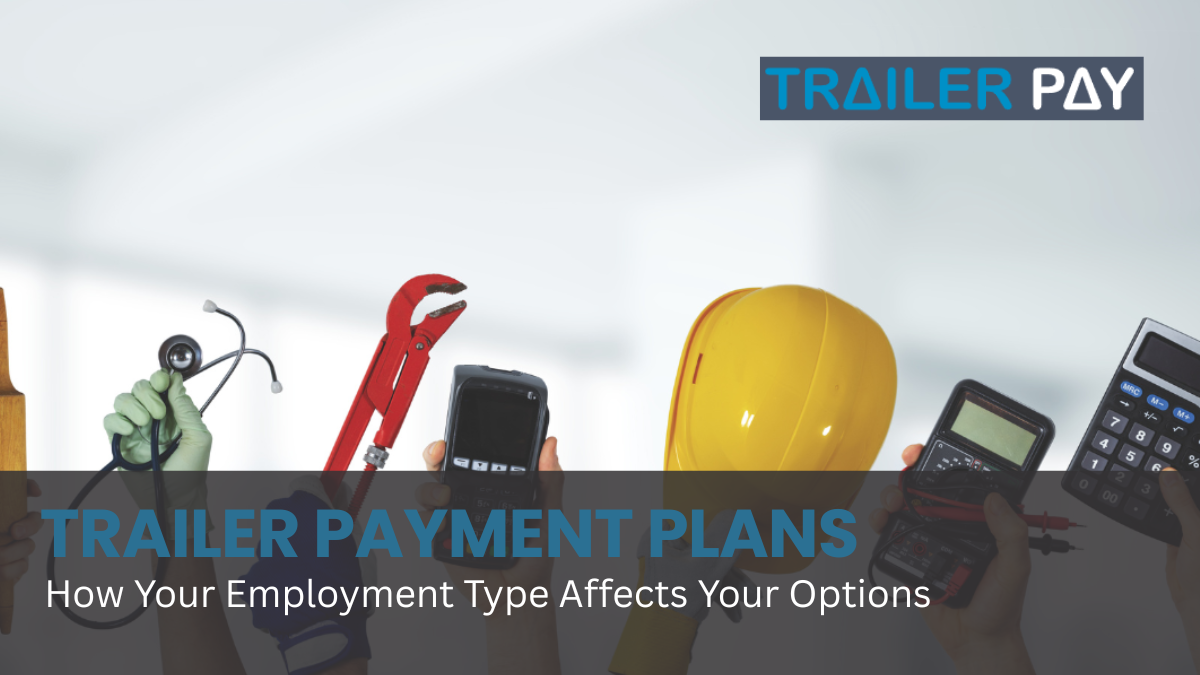
Trailer Payment Plans: How Your Employment Type Affects Your Options
Introduction
Your employment status significantly influences your trailer financing options, with different income types presenting unique advantages and challenges in securing affordable payment plans. Traditional lenders often favor conventional employment arrangements, but the evolving Australian workforce includes increasing numbers of contractors, casual workers, and self-employed individuals who require flexible financing solutions that accommodate their income patterns and documentation capabilities.
Trailer Pay recognizes that quality trailers serve essential purposes across all employment types, from tradespersons needing work vehicles to families requiring recreational trailers for leisure activities. Understanding how employment classification affects payment plan eligibility enables prospective buyers to prepare appropriate documentation, select suitable financing structures, and maximize their approval chances while securing affordable monthly payments that align with their income cycles.
Overview
This comprehensive guide examines how different employment types influence trailer finance approval processes and payment plan options available through Trailer Pay's flexible financing solutions. We'll explore the specific requirements, advantages, and challenges associated with various employment classifications while providing practical strategies for optimizing approval chances regardless of employment status.
You'll discover the documentation requirements for different employment types, learn about payment plan structures that accommodate various income patterns, and understand how to prepare for payment plan discussions with Trailer Pay's team. We'll also cover strategies for strengthening applications, managing approval timeframes, and selecting trailer options that align with financing capabilities across all employment categories.
Key Takeaways
- Employment type significantly impacts documentation requirements and approval criteria for trailer finance
- PAYG employees typically enjoy streamlined approval processes with standard income verification methods
- Self-employed applicants need comprehensive financial documentation but can access specialized payment plans
- Casual and contract workers benefit from flexible payment structures that accommodate variable income patterns
- Trailer Pay's flexible payment plans accommodate different employment types and income patterns
- Proper documentation preparation and realistic payment planning improve approval chances across all employment types
Employment Classifications in Finance
How Lenders Categorize Employment Types
Financial institutions classify employment into distinct categories that determine documentation requirements, risk assessment criteria, and available payment plan structures. These classifications reflect the predictability and verifiability of income streams, with each category requiring different approaches to demonstrate repayment capacity and financial stability. Understanding these distinctions helps applicants prepare appropriate documentation and set realistic expectations for the approval process.
Pay-As-You-Go (PAYG) employees represent the most straightforward category for lenders, with predictable income streams, standardized documentation through payslips and employer verification, and established credit assessment procedures. This employment type typically receives the most favorable terms and streamlined approval processes due to the perceived stability and verifiability of income sources.
Self-employed individuals, contractors, and casual workers present more complex assessment challenges due to variable income patterns, different documentation requirements, and the need for alternative verification methods. However, these employment types often generate substantial income and demonstrate entrepreneurial capability that sophisticated lenders recognize as valuable characteristics for payment plan success.
Income Verification Standards Across Categories
Each employment type requires specific documentation to verify income capacity and demonstrate ability to service payment plan obligations. The documentation standards reflect the different ways income is generated, reported, and verified across employment classifications, with some requiring more comprehensive evidence than others to establish payment capacity.
PAYG employees typically provide recent payslips, employment contracts, and employer contact information for verification purposes. The standardized nature of this documentation enables rapid processing and straightforward income calculation, making PAYG applications generally faster and more predictable than other employment types.
Alternative employment arrangements require more comprehensive documentation including tax returns, business activity statements, bank statements, and sometimes accountant letters or profit and loss statements. While this documentation takes longer to prepare and assess, it often provides a more complete picture of financial capacity than simple payslip verification.
Employment Category Characteristics:
- PAYG employees benefit from streamlined approval processes and standard documentation requirements
- Self-employed applicants demonstrate income through tax returns and business financial statements
- Contractors provide evidence of ongoing work arrangements and income history
- Casual workers show employment consistency and income patterns through extended documentation periods
- Each category offers specific advantages when properly documented and presented
PAYG Employee Advantages and Requirements
Streamlined Approval Processes
PAYG employees enjoy significant advantages in trailer finance applications due to the predictable nature of their income and the standardized documentation available for verification purposes. Employers provide consistent payslips that clearly demonstrate gross income, tax deductions, and net available income for payment plan obligations. This transparency enables rapid assessment and often results in faster approval decisions compared to other employment types.
The stability associated with permanent employment positions creates confidence among payment plan providers regarding ongoing income capacity. Long-term employment with established companies demonstrates commitment and reduces perceived risk of income interruption, often resulting in more favorable payment terms and higher approval amounts relative to demonstrated income capacity.
Employment contracts and annual salary arrangements provide clear evidence of future income expectations, enabling payment plan providers to assess long-term affordability with greater confidence. This forward-looking capability proves particularly valuable for longer-term payment plans where ongoing affordability throughout the plan duration requires careful consideration.
Documentation Requirements and Verification
PAYG employees typically need to provide recent payslips covering the most recent pay periods, employment contracts or letters confirming position and salary details, and contact information for employer verification if required. Some payment plan providers may request bank statements to verify that stated income actually deposits into accounts and to assess overall financial management patterns.
The verification process for PAYG employees often includes direct employer contact to confirm employment status, position tenure, and income details. This verification provides independent confirmation of information provided in the application and helps establish the reliability of ongoing income for payment plan duration assessment.
Additional documentation may be required for employees with complex pay structures including commission, overtime, or bonus components. These variable income elements require longer documentation periods to establish average income levels and demonstrate consistency over time, though they can significantly strengthen applications when properly documented.
PAYG Documentation Essentials:
- Recent payslips demonstrating consistent income over required periods
- Employment contracts or employer letters confirming position and salary details
- Bank statements showing regular salary deposits and financial management patterns
- Contact information for employer verification and income confirmation
- Additional documentation for complex pay structures including commissions or bonuses
Self-Employed Applicant Strategies

Comprehensive Financial Documentation
Self-employed applicants must provide more extensive financial documentation to demonstrate income capacity and business stability, but this comprehensive approach often reveals stronger financial positions than initial assessments might suggest. Tax returns from recent years provide official income verification while business activity statements demonstrate ongoing operational activity and revenue patterns throughout assessment periods.
Bank statements become particularly important for self-employed applicants as they show actual cash flow patterns, business expense cycles, and available funds for payment plan obligations. The detailed transaction history helps payment plan providers understand business operations while demonstrating financial management capabilities that support payment plan approval decisions.
Professional accountant involvement often strengthens self-employed applications through provision of profit and loss statements, cash flow projections, and professional endorsement of financial position. Accountant letters can provide context for business performance, explain seasonal variations, and project future income capacity based on business trends and market conditions.
Business Income Assessment Methods
Payment plan providers use various methods to assess self-employed income, often averaging income over multiple years to account for business cycle variations and seasonal fluctuations. This averaging approach can benefit self-employed applicants whose recent performance exceeds historical averages, though it may disadvantage those experiencing temporary business challenges.
Net profit calculations from tax returns provide the foundation for income assessment, though some providers consider gross business income and make allowances for business expenses that don't affect personal cash flow. Understanding these calculation methods helps self-employed applicants prepare documentation that presents their income in the most favorable light.
Business growth trends and market position can influence approval decisions beyond simple income calculations. Established businesses with strong market positions, growing revenue trends, and diversified income streams often receive more favorable consideration than newer ventures or businesses dependent on single income sources.
Self-Employed Success Factors:
- Multiple years of tax returns demonstrating consistent or growing income patterns
- Comprehensive bank statements showing strong cash flow and financial management
- Professional accountant involvement providing credibility and financial projections
- Business registration and licensing documentation establishing legitimate operations
- Market position evidence and growth trend documentation supporting future income projections
Contractor and Casual Worker Considerations
Variable Income Documentation
Contractors and casual workers face unique challenges in demonstrating income consistency due to the project-based or variable nature of their work arrangements. However, these employment types often generate substantial income and demonstrate valuable skills that sophisticated payment plan providers recognize as positive characteristics for payment plan success.
Extended documentation periods help establish income patterns and demonstrate earning capacity despite variable work arrangements. Providing twelve months or more of bank statements, multiple contract agreements, and evidence of ongoing work relationships helps build confidence in future income capacity and payment plan affordability.
Industry demand and skill specialization can strengthen contractor applications by demonstrating market value and ongoing income opportunities. Contractors in high-demand industries with specialized skills often enjoy strong income security despite the absence of traditional employment relationships.
Flexible Payment Plan Structures
Trailer Pay's payment plan options can accommodate the variable income patterns common among contractors and casual workers through flexible payment structures that align with income cycles. Understanding these options helps contractors select payment plans that match their cash flow patterns while maintaining affordability throughout the payment term.
Seasonal workers and project-based contractors may benefit from payment plans that accommodate income fluctuations through seasonal adjustment options or payment timing flexibility. These specialized structures recognize the reality of variable income while maintaining payment plan viability for both parties.
The ability to demonstrate consistent earning capacity over time, even with variable monthly income, often proves more important than perfectly consistent monthly earnings. Payment plan providers increasingly recognize that skilled contractors and casual workers with strong industry demand can provide excellent payment plan performance despite non-traditional employment arrangements.
Contractor Optimization Strategies:
- Extended documentation periods demonstrating consistent earning patterns over time
- Multiple contract agreements and client relationships showing diversified income sources
- Industry credentials and specialization evidence supporting ongoing market demand
- Flexible payment plan selection matching income cycles and cash flow patterns
- Professional references and work history demonstrating reliability and skill value
Payment Plan Estimation and Planning

Working with Trailer Pay's Team
Trailer Pay's experienced team works directly with applicants across all employment types to develop payment plan estimates that align with individual financial circumstances and income patterns. This personalized consultation approach ensures that payment obligations remain manageable throughout the plan duration while maximizing trailer purchasing power within realistic financial parameters.
The consultation process involves detailed discussion of income patterns, employment stability, and payment preferences to identify optimal payment structures for each applicant's circumstances. This collaborative approach proves particularly valuable for applicants with non-traditional employment arrangements who benefit from customized payment plans that accommodate their specific income cycles and financial planning requirements.
Understanding payment obligations before trailer selection helps applicants make informed decisions about trailer types, features, and pricing that align with realistic payment capacity. This preparation prevents disappointment and ensures that selected trailers match both functional requirements and financial capabilities throughout the payment plan duration while maintaining comfort with monthly obligations.
Scenario Planning for Different Employment Types
Different employment types can work with Trailer Pay's team to explore various payment scenarios that reflect their specific income patterns and financial planning requirements. PAYG employees might focus on maximizing trailer value within consistent monthly payment capacity, while self-employed applicants might explore payment structures that accommodate business cash flow cycles.
Contractors and casual workers can discuss different payment scenarios to ensure affordability during variable income periods while maximizing purchasing power during peak earning cycles. This scenario planning helps identify optimal payment structures that provide financial security while enabling trailer acquisition for work or recreational purposes without creating financial stress during lower-income periods.
The consultation also helps applicants understand the impact of different deposit amounts on monthly payment obligations, enabling strategic financial planning that optimizes cash flow management. Larger deposits reduce monthly payments but require more upfront investment, while smaller deposits preserve cash flow but increase monthly obligations throughout the payment plan duration.
Planning Optimization Tips:
- Work directly with Trailer Pay's team to model payment scenarios for specific employment patterns
- Discuss different deposit amounts to optimize cash flow management and monthly obligations
- Consider income variability when selecting payment terms and monthly payment levels
- Use consultation insights to guide trailer selection within realistic financial parameters
- Plan for employment-specific factors that might affect payment capacity over the plan duration
Strengthening Your Finance Application

Documentation Best Practices
Successful trailer finance applications require careful preparation of documentation that clearly demonstrates income capacity, financial stability, and payment plan affordability regardless of employment type. Organized, comprehensive documentation packages demonstrate professionalism and attention to detail that payment plan providers value in assessment processes.
Complete documentation packages should include all required primary documents plus supporting materials that strengthen the application and provide context for any unique circumstances. Additional documentation might include references, bank statements covering extended periods, or professional letters that explain income patterns or business circumstances relevant to payment plan assessment.
Accuracy and consistency across all documentation elements prevent delays and questions that can slow approval processes. Ensuring that names, addresses, income figures, and dates align across all documents demonstrates attention to detail and prevents confusion during the assessment process that could delay approval decisions.
Alternative Income Verification Methods
Applicants with non-traditional employment arrangements can strengthen applications through alternative verification methods that demonstrate income capacity and financial stability. Bank statements showing consistent deposits, client references confirming ongoing work relationships, and professional associations demonstrating industry recognition all provide valuable supporting evidence.
Digital payment platforms and online work arrangements may require specialized documentation approaches including platform earnings statements, client payment confirmations, and evidence of ongoing work relationships. These modern income sources require creative documentation approaches but can demonstrate substantial earning capacity when properly presented.
Professional references from clients, employers, or industry colleagues can provide valuable context for income patterns and work arrangements that traditional documentation might not fully capture. These references help payment plan providers understand the applicant's professional standing and income reliability from industry perspectives.
Application Enhancement Strategies:
- Organize comprehensive documentation packages demonstrating professionalism and preparation
- Include supporting materials that provide context and strengthen primary documentation
- Ensure accuracy and consistency across all documentation elements and application details
- Provide alternative verification methods appropriate for specific employment arrangements
- Include professional references and industry credentials that support income and reliability assessments
Managing Approval Timeframes and Expectations
Processing Times by Employment Type
Approval timeframes vary significantly based on employment type complexity and documentation requirements, with PAYG employees typically experiencing faster processing than self-employed applicants who require more comprehensive assessment. Understanding these variations helps applicants plan appropriately and set realistic expectations for approval timing and trailer availability.
PAYG applications with standard documentation often receive rapid processing and approval decisions within days of complete application submission. The straightforward nature of income verification and established assessment procedures enable efficient processing that benefits applicants seeking quick approval for trailer purchases.
Self-employed and contractor applications typically require longer processing periods due to the complexity of financial assessment and the need for detailed documentation review. However, this extended processing often results in more thorough assessment that can lead to higher approval amounts and more favorable terms when financial strength becomes apparent through comprehensive documentation.
Communication and Follow-Up Strategies
Maintaining regular communication with payment plan providers throughout the approval process helps ensure timely processing and rapid resolution of any questions or additional documentation requirements. Prompt response to requests for additional information prevents delays and demonstrates commitment to completing the approval process efficiently.
Understanding the specific requirements and preferences of payment plan providers helps applicants prepare documentation and respond to requests in ways that facilitate rapid processing. Some providers prefer specific documentation formats or submission methods that can significantly impact processing efficiency when properly followed.
Realistic timeline planning accommodates potential delays while ensuring trailer availability aligns with approval completion. Understanding seasonal variations in processing times and workload patterns helps applicants time their applications for optimal processing efficiency and trailer delivery coordination.
Timeline Management Tips:
- Understand processing time variations based on employment type and documentation complexity
- Maintain regular communication with payment plan providers throughout the approval process
- Respond promptly to requests for additional information or documentation
- Plan realistic timelines that accommodate potential delays and seasonal processing variations
- Coordinate trailer selection and delivery timing with expected approval completion dates
Trailer Selection Based on Employment Type
Matching Trailers to Income Patterns
Different employment types benefit from trailer selection strategies that align purchase decisions with income patterns, usage requirements, and payment plan affordability considerations. Understanding these relationships helps applicants select trailers that provide optimal value while maintaining financial comfort throughout the payment plan duration.
PAYG employees with predictable income might prioritize trailer features and quality over absolute lowest cost, selecting trailers that provide long-term value and satisfaction. The consistent income provides confidence in payment plan affordability that enables focus on functional requirements and personal preferences rather than minimum cost considerations.
Self-employed applicants might consider trailers that provide business utility or tax advantages alongside personal use, maximizing the value proposition through business deductions or operational benefits. Work-related trailer usage can often justify higher-quality selections that provide business benefits beyond personal recreational value.
Business Use Considerations
Contractors and tradespeople can often justify higher-quality trailer selections through business use applications that provide tax benefits and operational advantages. Work-related trailer usage enables business expense treatment that can significantly improve the overall value proposition beyond simple personal recreational considerations.
Commercial-grade trailers designed for business use often provide superior durability and functionality that justify higher purchase prices through extended service life and reduced maintenance requirements. These benefits prove particularly valuable for contractors who depend on trailers for business operations and cannot afford equipment failures or maintenance delays.
The ability to demonstrate business use through documentation and operational requirements can strengthen payment plan applications by showing practical necessity rather than discretionary spending. This business justification often improves approval prospects and may enable higher approval amounts based on business income capacity rather than purely personal financial assessment.
Selection Strategy Factors:
- Align trailer selection with employment-specific income patterns and usage requirements
- Consider business use applications that provide tax advantages and operational benefits
- Balance purchase price with long-term value and payment plan affordability over full term
- Evaluate commercial-grade options for business users requiring superior durability and functionality
- Document business use requirements that support higher-value trailer selections and larger payment plans
Terms and Conditions Awareness
Understanding Trailer Pay's Policies
Trailer Pay operates under specific terms and conditions that all applicants must understand before committing to payment plans, ensuring transparency and appropriate expectations throughout the purchase and payment process. These policies protect both Trailer Pay and customers by establishing clear guidelines for all aspects of the transaction and ongoing relationship.
The $200 non-refundable deposit requirement applies to all approved applications regardless of employment type, representing commitment to the purchase while enabling Trailer Pay to secure and prepare selected trailers. Understanding this requirement helps applicants prepare financially and commit appropriately to their trailer selection and payment plan obligations.
Modification requests must be discussed directly with Trailer Pay rather than assumed to be automatically available, ensuring that any changes to standard specifications or arrangements receive proper consideration and pricing. This direct communication requirement prevents misunderstandings and ensures that all modifications receive appropriate documentation and cost assessment.
Customer Responsibility Areas
Warranty obligations remain with customers rather than Trailer Pay, requiring appropriate planning for maintenance and repair requirements throughout the trailer's service life. Understanding this responsibility helps buyers factor ongoing costs into their budget planning and select trailers with appropriate warranty coverage and service support.
Returns carry a 35% restocking fee that significantly impacts the financial outcome of purchase decisions, emphasizing the importance of careful trailer selection and realistic assessment of requirements before finalizing purchases. This policy encourages thorough evaluation during the selection process while protecting Trailer Pay from unnecessary return costs.
Delivery timeframes may vary without compensation for delays, requiring flexible planning that accommodates potential delivery scheduling variations. Understanding this policy helps buyers plan appropriately for trailer availability while recognizing that external factors may influence delivery timing beyond Trailer Pay's direct control.
Policy Compliance Essentials:
- Understand the $200 non-refundable deposit requirement and financial commitment implications
- Communicate directly with Trailer Pay regarding any modification requests or special requirements
- Plan for customer warranty responsibilities and ongoing maintenance obligations
- Consider the 35% restocking fee impact when making trailer selection decisions
- Allow flexible delivery planning that accommodates potential timing variations
Alternative Payment Solutions

Flexible Payment Plan Structures
Trailer Pay's payment plan options accommodate various employment types through flexible structures that recognize the diverse income patterns and financial requirements of modern Australian workers. These alternatives to traditional financing provide accessibility for buyers who might not qualify for conventional loans while maintaining affordable payment obligations.
Different payment plan terms enable buyers to select structures that align with their specific financial circumstances and income patterns. Longer terms reduce monthly payments but increase total costs, while shorter terms minimize total expense but require higher monthly commitments. Understanding these trade-offs helps buyers optimize their payment plan selection.
Seasonal payment adjustments or flexible payment timing options may be available for buyers with predictable income variations, enabling payment plan structures that accommodate known cash flow patterns. These specialized arrangements recognize that skilled workers with seasonal or project-based income can provide excellent payment performance when plans accommodate their income cycles.
Building Credit Through Payment Plans
Successful payment plan completion can contribute to positive credit history development for buyers across all employment types, providing long-term financial benefits beyond trailer acquisition. This credit building opportunity proves particularly valuable for self-employed individuals and contractors who may have limited traditional credit history due to non-conventional employment arrangements.
Consistent, timely payment plan performance demonstrates financial responsibility and payment capacity that future lenders recognize as positive credit characteristics. This payment history can improve access to other financing options including business loans, property mortgages, and vehicle financing for buyers who establish strong payment records.
Understanding the credit reporting implications of payment plan agreements helps buyers recognize the long-term benefits of reliable payment performance beyond simple trailer acquisition. This awareness encourages responsible payment behavior that provides lasting financial advantages through improved credit standing and future financing accessibility.
Payment Plan Optimization:
- Select payment plan terms that align with employment-specific income patterns and financial goals
- Consider seasonal adjustment options for buyers with predictable income variations
- Recognize credit building opportunities through consistent payment plan performance
- Balance monthly payment affordability with total cost considerations over the full plan term
- Maintain communication with Trailer Pay regarding any payment challenges or timing issues
Frequently Asked Questions
Q: How does being self-employed affect my trailer finance approval chances? A: Self-employed applicants need more comprehensive documentation including tax returns and bank statements, but can often secure approval with proper preparation. Trailer Pay's flexible payment plans accommodate various income patterns common among self-employed individuals.
Q: What documentation do PAYG employees need for trailer finance applications? A: PAYG employees typically need recent payslips, employment contracts or employer letters, and bank statements. The streamlined nature of this documentation often enables faster approval processing compared to other employment types.
Q: Can casual workers get approved for trailer payment plans? A: Yes, casual workers can secure payment plan approval by demonstrating consistent income patterns through extended bank statements and employment history. Flexible payment structures can accommodate variable income cycles common in casual employment.
Q: How can I estimate monthly payments before applying? A: Contact Trailer Pay's team directly to discuss payment plan options and receive personalized estimates based on your trailer selection, deposit amount, and employment circumstances. This consultation helps you plan financially before making final purchase decisions.
Q: What's the minimum deposit required for Trailer Pay's payment plans? A: Trailer Pay requires a $200 non-refundable deposit for all approved applications. This deposit secures your trailer selection and demonstrates commitment to the purchase and payment plan obligations.
Q: Do contractors need special documentation for trailer finance approval? A: Contractors should provide contract agreements, bank statements showing consistent income deposits, and evidence of ongoing work relationships. Extended documentation periods help demonstrate income reliability despite project-based work arrangements.
Q: How long does the approval process take for different employment types? A: PAYG employees often receive faster processing due to straightforward documentation, while self-employed and contractor applications may take longer due to comprehensive financial assessment requirements. Proper documentation preparation can expedite all application types.
Q: Can business owners claim tax benefits on trailers purchased through payment plans? A: Business use trailers may qualify for tax deductions and business expense treatment. Consult with your accountant regarding specific tax implications and documentation requirements for business-related trailer purchases.
Q: What happens if I need to modify my trailer specifications after approval? A: Any modifications must be discussed directly with Trailer Pay rather than assumed to be automatically available. Contact Trailer Pay to discuss modification options, pricing impacts, and availability before finalizing changes.
Q: Are there payment plan options for buyers with irregular income? A: Trailer Pay's flexible payment plans can accommodate various income patterns. Discuss your specific income cycle with Trailer Pay to explore payment structures that align with your financial circumstances and employment type.
Sources
- Australian Securities and Investments Commission (ASIC) - Responsible Lending Guidelines
- Australian Taxation Office - Employment Classification and Income Reporting
- Fair Trading Legislation - Consumer Protection in Finance Agreements
- Australian Competition and Consumer Commission - Consumer Rights in Purchase Agreements
- Trailer Pay Terms and Conditions - Current Business Policies and Procedures
Contact Trailer Pay for Personalized Payment Solutions
Ready to explore trailer payment options that work with your employment type? Trailer Pay's flexible payment plans accommodate PAYG employees, self-employed individuals, contractors, and casual workers across Australia. Contact our experienced team to discuss affordable payment plan options for your chosen trailer and receive personalized guidance that aligns with your specific employment situation and financial requirements. Start planning your trailer purchase today with transparent terms and flexible payment solutions designed for modern Australian workers.